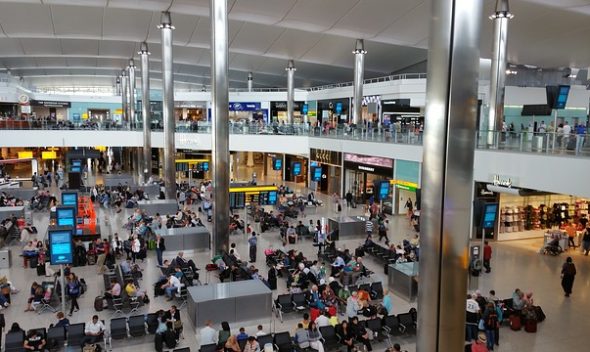Brexit secretary David Davis releases document highlighting need for new laws on immigration and customs systems after UK leaves EU
David Davis failed to placate Conservative rebels concerned about the status of European Union migrants and other Brexit details, despite publishing a 77-page white paper setting out the government’s plans for leaving the EU.
The Brexit secretary presented to parliament further details on the government’s approach, and promised that there have to be specific legislation to define the UK’s immigration and customs policy after the divorce is concluded.
Introducing it to the Commons, Davis said the UK’s “best days are still to come” outside the EU and promised a close relationship with the rest of Europe. He also said the UK would do its best to avoid a “cliff-edge” effect.
“A never-ending transitional status is emphatically not what we need, not what we seek,” he said. “But a phased process of implementation of new arrangements – whether immigration controls, customs systems, the way we operate and cooperate on criminal and civil justice matters, on future regulatory and legal frameworks of business will be necessary for both sides.”
But there was no development on the future legal status of EU nationals living in the UK or British expats abroad, after the white paper said it had “not proven possible” to reach agreement on future rights with the European Union.
While some Tory backbenchers welcomed the reassurances in the document several said they remained worried about the future for EU citizens living in the UK – and asked what would happen at the end of the two year negotiation period.
In the House of Commons, Theresa Villiers, the former cabinet minister and Brexit campaigner, was one of those who asked for greater certainty, highlighting the case of a constituent, an EU national who has cancer.
Villiers said she was “very anxious to be able to give her certainty as soon as possible that she will continue to have access to the NHS”. She told the Guardian she would “keep making the point over and over again in parliament because on both sides of the house everyone is agreed to that our main objective is to see EU citizens already resident continuing to enjoy all the rights they have at present”.
Nigel Evans, a Tory MP and leave supporter, said it was a “form of mental torture and trauma” for EU leaders not to agree to a deal securing the rights of EU nationals in the UK and UK nationals in the EU. “Will he redouble his efforts to get this deal done as quickly as possible and make the announcement as quickly as possible?” Evans asked.
MPs have tabled more than 150 pages of amendments to the government bill authorising ministers to trigger Brexit, which will be debated when the legislation reaches its committee stage in the House of Commons next week.
Harriet Harman has drafted an amendment that would guarantee the rights of EU citizens already living in Britain that has already won the support of more than 30 MPs, including former Lib Dem leader Nick Clegg.
Speaking in the Commons yesterday on the issue of EU citizens’ rights, Davis said there was “no question that this is not going to happen”, arguing it was simply a matter of the timing of a joint announcement by all EU member states. He said it was clear that nobody would be “throwing people out of Britain” as a result of the Brexit deal.
The white paper, entitled The United Kingdom’s Exit From and New Partnership With the European Union, was published a day after MPs voted overwhelmingly to permit May to press ahead with starting withdrawal negotiations.
It contained a number of new policy suggestions including potential dispute resolution mechanisms for a trade deal with the EU, which could see a new arbitration system set up.
In an introduction to the report, May said the UK does “not approach these negotiations expecting failure, but anticipating success”.
Behind the scenes, a number of senior Tories, from both the leave and remain camps, are pressing No 10 to unilaterally guarantee the rights of EU citizens to remain in the UK but the government has not yet relented, given the lack of an EU-wide deal. They are also calling for a stronger role for parliament throughout the two-year negotiation process.
Anna Soubry, who was a key figure in persuading May to publish the white paper, said she trusted the prime minister to act on the status of EU nationals as soon as possible; but would be studying possible amendments on what she called the “end-game”.
“My concern is that if we get a deal, we get a vote in parliament; but if we don’t get a deal, the government has a very serious problem”, she said.
Labour backbencher Helen Goodman has tabled an amendment on whether the government must come back to parliament if no deal has been secured at the end of two years – something many EU experts believe is likely.
Neil Carmichael, a Tory backbencher opposing a hard Brexit, said he was still thinking about whether to back any amendments to the bill, and would continue to press the government to consult parliament regularly.
”I think it is really important parliament has a role during the next two years because I feel this is a much more complex issue than the white paper acknowledges. We are vulnerable to events and parliament will need to respond in an appropriate and measured way. I think nothing less than pretty regular updates is appropriate,” he said.
Carmichael said he would not rule out backing the amendment on the rights of EU nationals as it was not fair to “leave people spinning in the wind”.
“The mood within the house is that we have set sail in a very stormy situation and many of us will have to contribute to the debate as it proceeds in the long term,” he said.
This article was first published in The Guardian by Rowena Mason and Heather Stewart on Thursday 2 February 2017.





